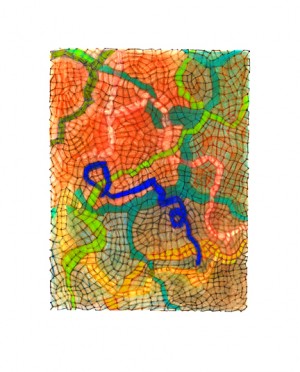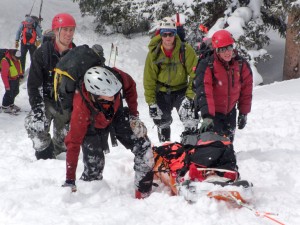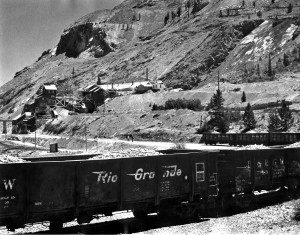by Martha Quillen
Too many environmentalists air their views about melting ice caps, peak oil, and gas-guzzling ignoramuses while talking about their long-distance road trips. Or photo safaris. Or whirlwind tours of foreign nations.
That’s irritating. So I always thought it best not to mix observations about my vacations with reflections about environmental matters. But some subjects are hard to resist.
In early May, I visited my daughters in Oregon, and the trip gave me a whole new perspective on environmental issues. I certainly didn’t start my vacation by musing about the environment. Before leaving, I was worried about getting to the airport on time and making it through security.
This time around, I was flying solo; Ed was staying home. I got a ticket on the Black Hills Stage Line bus from Salida to Denver, and several people told me they’d be interested in hearing about the bus ride.
It was fine. Buses are a lot more comfortable than they were twenty years ago, which is the last time I rode one more than a few miles. They’ve got bigger windows, more comfortable seats, and smell considerably better, with nary a hint of fuel fumes. The Salida bus even had seat belts – although none of them seemed to work. Otherwise, however, the trip was pleasant and economical, at a mere $23.85 (which included a transfer ticket from Denver’s RTD station to DIA).
But was the ride environmentally friendly? I don’t know. To be truthful, I wasn’t thinking about the environment when I took the bus; I’m just scared of city traffic. Environmental concerns came later.
Oregonians generally strike me as more invested in recycling, public transit, and organic products than Coloradans, perhaps because organic foods are more of an industry there. But this time around, the differences I saw were more personal.
Last year, my daughter Abby quit her job as a research assistant at the Eugene Public Library and started free-lancing in order to spend more time at home with her toddler. Since she started writing last fall, she’s sold numerous features about cooperatives – a communal chicken farm, a sustainable living center, a waffle restaurant that barters, a bike repair cooperative. Abby also gardens, raises chickens, produces a popular blog, and publishes information on natural foods, cosmetics, and cleaning materials.
Of course, I knew all that, but I was startled to realize that she also avoids most commercial pharmaceuticals, lotions and soaps, and has given up shampoo, conditioner, bleach, household cleansers, and paper towels.
Ed and I try to keep our thermostat set low, recycle aluminum and plastic, and remember our reusable bags when we go shopping, but our kids have always been better about such things. Abby’s current degree of dedication was new, though.
Her environmental sensibilities, however, are clearly not hers alone. Green ideas, recipes, and household tips are something she shares with her friends, neighbors, and readers.
And this isn’t only happening in Eugene. It’s happening in Salida, too. Here at home, interest in organic farming, natural products, chicken coops, knitting, quilting, recycling, crafts, and the clubs that support such activities is flourishing.
It merely took me a few days in Eugene to recognize how much this green, hands-on approach to living is changing things. This renewed interest in traditional skills reminds me a little of the Back to the Land movement of the 1970s, which was popularized by Mother Earth News.
But in this case people aren’t buying up twenty-acre properties in the boonies. They’re planting gardens in their backyards – and front yards. Abby’s neighborhood is right in the city, just a few blocks away from stores, restaurants, bike paths, and parks, as is our older daughter Columbine’s home in Bend.
While I was visiting, I noticed a home in Abby’s neighborhood where they’d dug up the front lawn to put in vegetables, and another one in Columbine’s neighborhood. In towns and cities across America, people are establishing community gardens, farmers markets, and energy fairs. Residents are raising chickens and joining agricultural co-ops. Authors are writing books about living without cars, prepared foods, television, electricity, and shopping.
Alarmists characterize Americans as hedonistic spendthrifts, but I never bought it. Nor did I believe the pessimistic, doom and gloom predictions that we would run out of fossil fuels by 1980; or procreate ourselves into extinction by 2020; or that our civilization can’t survive dwindling oil reserves and global warming. Yet I nevertheless assumed that any change in our wasteful, money-driven society would be slow and painful and would only happen after we’d endured horrifying catastrophes.
Now I’m not so sure.
I have two daughters living in Oregon, Columbine and Abby. Both are in their thirties, one is a bartender and one is a writer. I’ve pursued both occupations in my time, and yet my children are nothing like me. Ed and I tend to be a mite provincial. We’ve lived in the same small town for thirty-two years, and before that we lived in a smaller town. Until our daughters moved to Oregon, we usually vacationed in nearby campgrounds.
Columbine, on the other hand, has lived and worked in Iceland, Puerto Rico, and St. Thomas, and has traveled in Europe and South America, sometimes by herself. She’s worked as a raft guide, secretary, typist, and teacher; currently writes a column for a local newspaper; occasionally shares bartending skills on a locally televised cooking show; and also kayaks, climbs, and makes and sells jewelry.
Abby sends out more queries in a month than I ever have in a year, and has been more successful than a lot of more experienced writers I know because she accepts that rejection is a part of the process and doesn’t let apprehension hobble her. I am thoroughly astounded by the courage and tenacity of both my daughters. Their ability to change jobs and take on new challenges amazes me.
And on the plane, I got to observe another generation. And it is wired – by which I don’t mean stoned. A pre-teen across the aisle was nodding and bobbing to music on his iPod. The young woman behind me was frantically calling friends trying to find a free room in Seattle. And talk about multi-tasking: Instead of watching the in-flight movie, the young man sitting next to me (who appeared to be in his twenties) watched another movie on his lap top, while he talked, texted, and viewed home movies on his cell phone.
Pessimistic predictions about our future are based upon projected growth rates, production levels, and consumption patterns. But our society isn’t static. It is continually changing and evolving. Although Denverites in 1880 may have justifiably concluded that they’d be buried in horse manure in 50 years, that wasn’t a problem by 1930.
I’m not excited about all of the changes I see. I’m not thrilled about the idea of socializing via Facebook. Or hearing cell phones everywhere. And I generally plant flowers rather than vegetables because I despise tomato horn worms and those disgusting little maggots that get into root vegetables. But I’m encouraged about the future.
The younger generation is more capable than we tend to admit, and the environmental movement that’s currently unfolding strikes me as more promising than any that have come before it. Instead of being about what we’re doing wrong; this movement gives us opportunities to do things better. It’s not merely about politics and regulation. It’s about simplicity, affordability, cooperation, eating better, getting by with less, learning new skills, and spending more time with friends and family – and about acting rather than reacting. But mostly it’s about people believing they can make a difference – then doing just that.
Martha Quillen recycles words in Salida. Abby Quillen’s blog, New Urban Habitat, can be accessed at abbyquillen.com.


